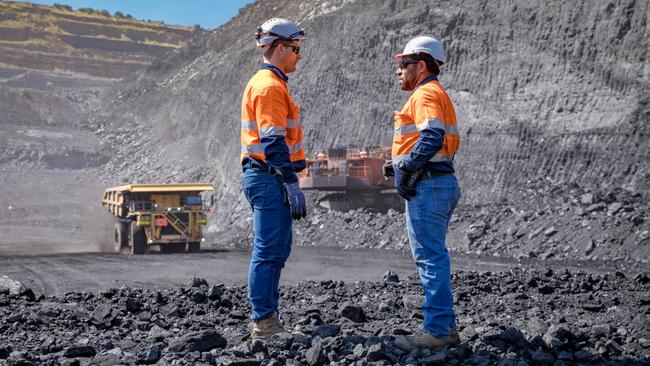Mining and Energy Union demands heavy industries investment to shore up coal wages in net zero
The Mining and Energy Union is worried about future wages of its members as coal-fired power stations close, pushing for investment in manufacturing, mining or power generation.

The Mining and Energy Union has demanded investment in new forms of manufacturing, mining and power generation, amid concerns coal workers won’t be able to maintain their wages in new jobs and industries as Australia transitions to a net-zero economy.
The call to diversify came a day after former Labor minister Greg Combet, who has been setting up the Net Zero Economy Authority, conceded he couldn’t guarantee workers in emissions-intensive industries would be paid the same after they transitioned to clean energy jobs.
MEU general secretary Grahame Kelly endorsed the “positive and important role” the authority, which is yet to be legislated, would play in finding jobs for members affected by power station closures but worried about future wages.
“We are certainly concerned about future wages for our members moving into new jobs and industries,” Mr Kelly said. “Coal mining and power jobs are well paid due to decades of union organising and collective bargaining, and they are important contributors to the regional economies.
“We believe the best way to create the conditions for future well-paid jobs is to diversify the economies of our energy regions. To do this, we need mechanisms to encourage investment in a range of heavy industries that can provide skilled, secure, ongoing work.
“New forms of manufacturing, mining or power generation could all play this role.
“As new industries get up and running, the MEU and the whole union movement are ready to organise them to lift pay and employment conditions.”
Nationals MP Colin Boyce, who represents the electorate of Flynn, home to three coal power stations and Australia’s biggest cement kiln, said the renewable energy sector couldn’t provide jobs for coal workers at the same skill level or salary.
He, along with Peter Dutton and the Coalition, is pushing for a coal-to-nuclear transition.
“How can you possibly guarantee that somebody who is earning a substantial wage in traditional power generation sources be paid the same thing in the renewables sector?” said Mr Boyce, who has repeatedly questioned a net zero by 2050 target supported by both major parties. “It doesn’t exist. What are we going to do? Have everybody mow lawns?”
Climate and Energy Minister Chris Bowen on Wednesday seized on the Clean Energy Regulator’s latest quarterly carbon market report, showing 3.3GW of rooftop capacity and 2.2GW of large-scale capacity was added in 2023, with renewables making up an average of 39 per cent of generation in the National Electricity Market.
“Australian households and businesses are benefiting from the switch to renewables, with the Albanese government delivering in 2023 more cheap, clean new capacity than could be produced by two large coal generators together,” Mr Bowen said.
Business Council of Australia chief executive Bran Black said the biggest issues facing a number of critical projects was investment uncertainty and competition. “Business will invest in these projects if the settings are right,” he said.
“The upcoming federal budget is an opportunity to … look at measures which will drive needed capital for projects linked to the energy transition.”




To join the conversation, please log in. Don't have an account? Register
Join the conversation, you are commenting as Logout